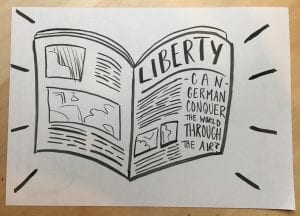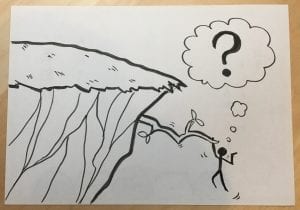The short story, “The Secret Life of Walter Mitty,” written by James Thurber, is about a man named Walter who lives his life constantly going in and out of reality. His normal life is quite dull, which results in him making up for past time by envisioning exhilarating scenarios starring himself. Every dream that Walter encounters is triggered by something that is currently on Walters mind, whether it be something he heard around him or something that caught his eye. This continues throughout the entire plot-line of the story, and ends with Walter mid-dream, leaving us with a general curiosity and wonderment. This project requires one to find quotes within the story to demonstrate a literary term, and to provide a brief explanation of why that quote represents what it does. One shall also provide a picture that encapsulates the quote and literary term in one, as well as make sense to the storyline itself.

EXPOSITION
“Walter drove on towards Waterbury in silence, the roaring of the SN202 through the worst storm in twenty years of Navy flying fading in the remote, intimate airways of his mind.”
Walter is still reminiscent of the dream he just experienced, which shows the exposition of the story because it shows the pathways between Walter’s reality and fantasy.

RISING ACTION #1
“He drove around the streets, aimlessly for a time, and then he drove past the hospital on his way to the parking lot.”
This is the trigger to his second daydream, which is part of the rising action because he has multiple dreams throughout the story, each leading him deeper into the storyline.

RISING ACTION #2
“’Where’s the what’s-its-name?’ she would ask. ‘Don’t tell me you forgot the what’s-its-name.’ A newsboy went by shouting something about the Waterbury trial.”
This is the trigger to the third dream in the story, where Walter is thinking about being questioned and heard about the trial, which led his dream to resemble him on the stand being accused of murder.

RISING ACTION #3
“He picked up an old copy of Liberty and sank down into the chair. ‘Can Germany Conquer the World Through the Air?’ Walter Mitty looked at the pictures of bombing planes and of ruined streets.”
This is the trigger to the fourth dream in the story, which led Walter to imagine himself as a high profile pilot in the air force. Each dream continues to build the plot-line further and further.

CLIMAX
“He turned and waved to the sergeant. ‘Cheerio!’ he said… Something struck his shoulder. “I’ve been looking all over this hotel for you,’ said Mrs. Mitty.”…“’I was thinking,’ said Walter Mitty. ‘Does it ever occur to you that I am sometimes thinking?’”
Walter has just reached a high point in his dream when his wife abruptly wakes him. He finally stands up for himself, a little meekly but still valid. That is the highest point of the story, because of the intense dream climax as well as Walter’s realization of his thinned patience.

FALLING ACTION
“Walter Mitty lighted a cigarette. It began the rain, rain with sleet in it. He stood up against the wall of the drugstore, smoking…”
Right after Walter confronts his wife, he drearily waits outside in the rain for her. This is the lead in to his final dream, which is the end of the story. He feels defeated, or frustrated, but accepts it.

DENOUEMENT
“Then, with that faint, fleeting smile playing about his lips, he faced the firing squad; erect and motionless, proud and disdainful, Walter Mitty the Undefeated, inscrutable to the last.”
This is the conclusion because it is the last event that occurs in the story, as well as the fact that it is Walter admitting to defeat, in his dream and also someway in his real life.

PHYSICAL SETTING
“She had told him, twice, before they set out from their house for Waterbury.”
This quote shows that they live in Waterbury.

EMOTIONAL SETTING
“’Hmm?’ said Walter Mitty. He looked at his wife, in the seat beside him, with shocked astonishment. She seemed grossly unfamiliar, like a strange woman who had yelled at him in a crowd.”
Throughout majority of the story, Walter is in a daze, and this quotes shows his confusion and unawareness that matches the tone of the story as well as the emotional setting.

CONFLICT TYPE
“Things close in,’ said Walter vaguely.”
Throughout the story, Walter is constantly going in and out of dreams, causing him to lose track of what’s going on in his real life, and repeatedly annoying his wife. In this quote it shows the conflict type is person vs. self, because you can see how tired he is of the interchanging worlds, and how it affects his real life.

ENDING TYPE
“He stood up against the wall of the drugstore, smoking…”
The ending type is unresolved/ cliffhanger. This quote is the last thing that Walter did in his real life before he started dreaming again, so we will never really know what happens when his wife gets back, or what happens in his dream.

IRONY EXAMPLE
“What are you driving so fast for?”
This is ironic because in his dream he is driving the hydroplane at an extremely high speed, and then his wife yells at him for driving at 55 km, which is nothing compared to the speed of the hydroplane in his dream.

SUSPENSE EXAMPLE
“Walter Mitty the Undefeated, inscrutable to the last.”
This is the last sentence of the story, and leaves us wondering what happened to Walter in the dream, but also what happened to Walter in real life. Do the dreams finally get to him, causing a mental break down? Will his wife leave him for not paying enough attention to her? We will never find out, which is what leaves us in a desperate curiosity.

















